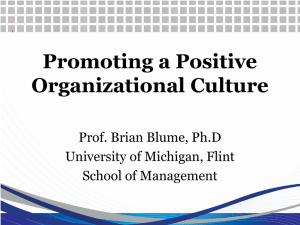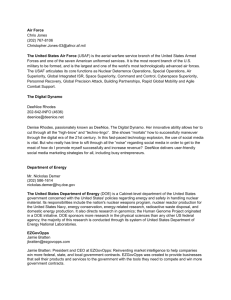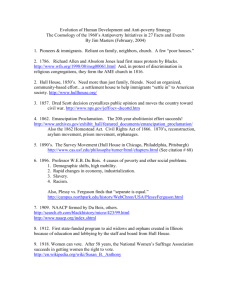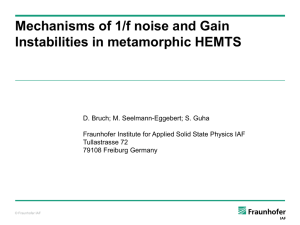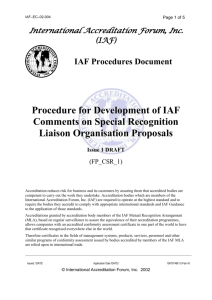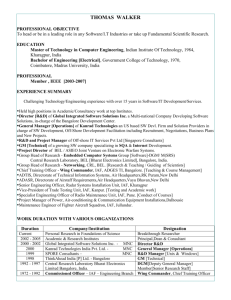Letter to Ray Haefele on IAF
advertisement
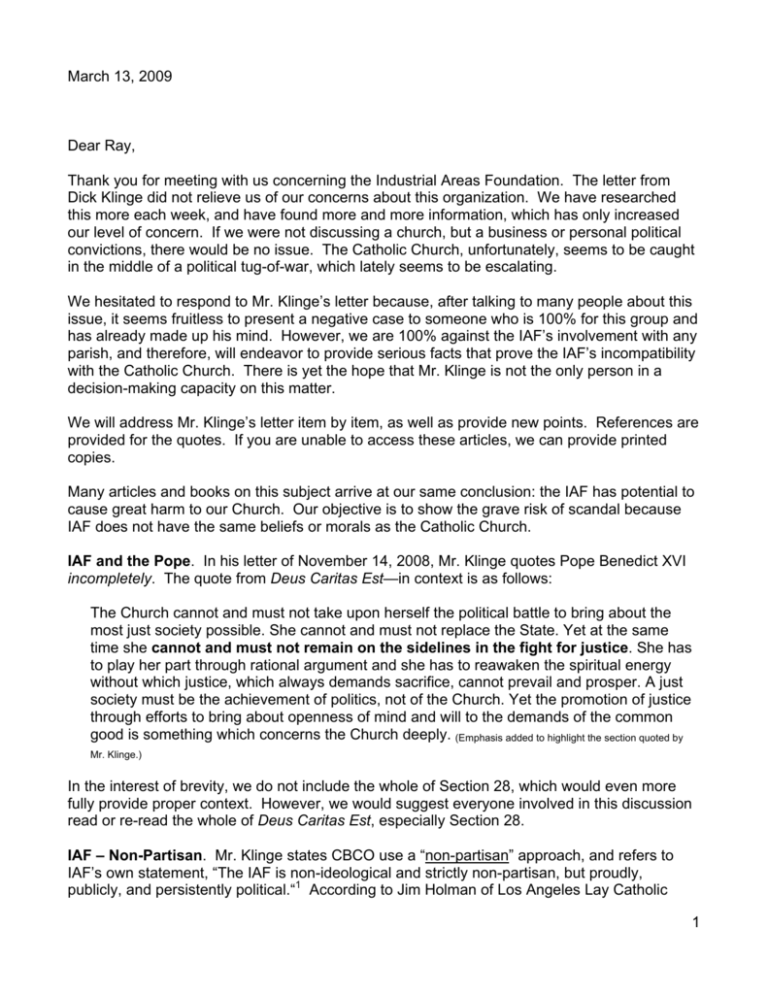
March 13, 2009 Dear Ray, Thank you for meeting with us concerning the Industrial Areas Foundation. The letter from Dick Klinge did not relieve us of our concerns about this organization. We have researched this more each week, and have found more and more information, which has only increased our level of concern. If we were not discussing a church, but a business or personal political convictions, there would be no issue. The Catholic Church, unfortunately, seems to be caught in the middle of a political tug-of-war, which lately seems to be escalating. We hesitated to respond to Mr. Klinge’s letter because, after talking to many people about this issue, it seems fruitless to present a negative case to someone who is 100% for this group and has already made up his mind. However, we are 100% against the IAF’s involvement with any parish, and therefore, will endeavor to provide serious facts that prove the IAF’s incompatibility with the Catholic Church. There is yet the hope that Mr. Klinge is not the only person in a decision-making capacity on this matter. We will address Mr. Klinge’s letter item by item, as well as provide new points. References are provided for the quotes. If you are unable to access these articles, we can provide printed copies. Many articles and books on this subject arrive at our same conclusion: the IAF has potential to cause great harm to our Church. Our objective is to show the grave risk of scandal because IAF does not have the same beliefs or morals as the Catholic Church. IAF and the Pope. In his letter of November 14, 2008, Mr. Klinge quotes Pope Benedict XVI incompletely. The quote from Deus Caritas Est—in context is as follows: The Church cannot and must not take upon herself the political battle to bring about the most just society possible. She cannot and must not replace the State. Yet at the same time she cannot and must not remain on the sidelines in the fight for justice. She has to play her part through rational argument and she has to reawaken the spiritual energy without which justice, which always demands sacrifice, cannot prevail and prosper. A just society must be the achievement of politics, not of the Church. Yet the promotion of justice through efforts to bring about openness of mind and will to the demands of the common good is something which concerns the Church deeply. (Emphasis added to highlight the section quoted by Mr. Klinge.) In the interest of brevity, we do not include the whole of Section 28, which would even more fully provide proper context. However, we would suggest everyone involved in this discussion read or re-read the whole of Deus Caritas Est, especially Section 28. IAF – Non-Partisan. Mr. Klinge states CBCO use a “non-partisan” approach, and refers to IAF’s own statement, “The IAF is non-ideological and strictly non-partisan, but proudly, publicly, and persistently political.“1 According to Jim Holman of Los Angeles Lay Catholic 1 Mission, “Given the heavily partisan character of American politics, one might find this selfdescription perhaps disingenuous.”2 Any examination of their activities, or those of the organizations they have trained, reveals a consistent ideological agenda representing the “left” or progressive side. This is not only our conclusion, but also the conclusion of most writers about IAF—including those who write favorably about IAF. Assistant Professor of Political Science at Rutgers University—Heidi Swarts, states, “What makes CBCO ideology liberal rather than conservative is that it advocates not private or voluntarist solutions but collective and public programs. They seek action from the state: social welfare programs, redistribution, or regulation.” Swarts adds, “Church-based community organizing... harnesses ‘family’ and ‘values’ to a progressive rather than a conservative politics.”3 She also mentions COPS (a CBCO affiliate of IAF in San Antonio), which “played a decisive role in winning district elections which, combined with the city’s 53% Hispanic population, helped shift the balance of power in San Antonio.”4 Anthony Mansueto confirms this, more specifically to IAF, in his article, “In short, the IAF has undertaken precisely the tasks which the left has traditionally assigned to broad, popular front organizations, carrying them out in a way that shows unusual depth and sophistication...”5 IAF also is heavily involved in get-out-the vote campaigns, and affected changes in past elections. In the last two weeks of the 2004 elections Arnie Graf, an organizer with IAF for over thirty years, and about ten fellow organizers from Maryland and DC, accepted an invitation from a community-based organization to boost voter turnout in the city of East Cleveland. In Graf’s own words, “We wound up covering every door, about 30,000 people, and we decided instead of canvassing and talking about Iraq or how many jobs had been lost in Ohio we would talk to people about what was happening in East Cleveland.” Graf’s team recruited 140 volunteers for door-to-door canvassing. When the election was over Kerry’s vote total in East Cleveland exceeded Gore’s by 97 percent.6 There is much evidence that IAF is a partisan organization. Quote. At the bottom of the first page of Mr. Klinge’s letter is a quote he describes as being from someone “familiar with the successes of the IAF in many communities.” It is not surprising that this person would be familiar with IAF successes, given that he is quoting Michael Gecan, the lead organizer for the East Brooklyn Congregations and a member of the Executive Team of the national IAF. Gecan has written several books about organizing; this quote is from his book Going Public. From reading the letter, we took the quote as being from someone present at the meeting. Did we misread the letter, or was Mr. Gecan present at the meeting? If he was not, whomever Mr. Klinge quotes must be familiar with Mr. Gecan’s philosophy. USCCB, CCHD, IAF. Mr. Klinge cites the support of the CCHD for IAF affiliated organizations as evidence of the acceptability of the IAF and its affiliates. While it is probably true that the CCHD has not intentionally supported any groups that directly support abortion, an examination of the indirect results of their grantees’ efforts presents a much murkier picture. While it is not our intention in this letter to delve into the shortcomings of the CCHD, their record of stewardship of the Bishops’ trust and their donor’s money leaves much to be desired. Therefore, given their demonstrated lack of judgment, I put no credibility in the value of their endorsement of the IAF or its affiliates. I personally would not trust them with an acorn, let alone my financial donations. 2 Process. We thank Mr. Klinge for describing in detail the process of house meetings and gathering “stories” which is the classic IAF method to establish credibility within the parish. As we have done extensive research, we are very familiar with the “process.” The controlled line of questioning will steer the conversation to social and economic needs of the community, instead of open questions, which would reveal true needs. The organizer’s training enables him to steer the agenda at will. The needs must also be ideologically neutral, and easily winnable. However, if the majority of the parishioners overwhelmingly responded that pro-life issues were the “needs” of the community, the IAF would still not support them. “...CBCO stays strictly away from the ‘third rail’ of the culture wars—abortion and homosexuality...”7 It may take a few years of local “actions” to prepare the team, but the IAF’s goals will come: “The organizer’s issue gets dealt with last. If you want your issue to be dealt with first, you’ll never build anything. So you lead with other people’s issues, and you teach them how to act on their issues. Then you model what is to be reciprocal, you model what it is to have a long term vision.”8 The IAF’s vision for America and the world is not our vision. The IAF knows to obtain a power-base strong enough to support the organizer’s issues, the churches and clergy must trust the IAF. “The question, then concerns how democratic organizing might begin around small issues that are immediately connected to people’s lives and winnable (concerning missing street signs, specific abandoned houses, potholes, etc.) yet simultaneously link these issues to broader critiques and the task of building larger networks that might transform structures of power.”9 We have no doubt the meetings will eventually identify issues and problems, and the CBCO is capable of successfully addressing these “issues.” However, long term it will result in our Church being politicized and used as a power base for the “Progressive” agenda. “...it is IAF organizations and others deeply informed by them that have been remarkably successful at broadening and sustaining broad-based networks of democratic power, cultural change, and significant redistribution at the local level (around housing living wages, infrastructure, schools, etc.).”10 This belief system and the literature supporting it, suggests Alinskian organizations “focus on ways to move beyond local organizing to address large corporate and state power,” as well as introduce “...more radical analyses and networks of organizing aimed at contesting larger modes of power” resulting in “deeper cultural and political economic transformations.”11 Quotes. It may be our Christian duty to “dialogue” with those of other faiths, however, we would rather do it in the spirit of evangelization, not power brokering. Rather than E pluribus unum, the one IAF hurts many churches. Their presence in our Church harms the people who feel they are contributing to helping the poor, rather than politicizing the Church and the poor. Joseph Varacalli states, “In terms of a general theological worldview certain statements are taken out of their proper context… and used to transform radically what passes for the Faith. The Church ‘as the People of God’ is used to promote a false and disingenuous democratic attitude.”12 Much of the IAF “propaganda” is used to convince parishes, priests, and bishops of IAF’s potentially great accomplishments in our parish. “The divorce of truth from freedom that is the essence of judicial activism carries the seeds of the culture of death. The Holy Father warned in Centesimus Annus, ‘If there is no ultimate truth to guide and direct political activity, then ideas and convictions can easily be manipulated for reasons of power… In a world without truth, freedom loses its foundation and man is exposed to the violence of passion and to manipulation, both open and hidden.’”13 I will now address the “factual responses” provided by Mr. Klinge in his Exhibit A: 3 1. Saul Alinsky. First, let us concede that Saul Alinsky is dead. This has been pointed out to us numerous times in the last several months. However, Saul Alinsky did found the Industrial Areas Foundation (IAF), and Saul Alinsky is still a prominent influence on the current members of this organization. The IAF members refer to him often in their speeches, and still list Alinsky’s books on the IAF website under the heading of “Books by IAF.”14 Although the IAF may have “reorganized” itself in the 1970’s, the changes were strategic and cosmetic, not moral. Ed Chambers, executive director of the national IAF, conforms to Alinsky’s teachings of fitting in an organization: “I’d had a little training in philosophy. And I started forcing myself to look at what our kind of organizing meant to people. We worked with people in the churches, and their language was the language of the gospel. Their language was nothing like Alinsky’s language. His language was power talk. Tough, abrasive, confrontational, full of ridicule. And those are really all non-Christian concepts. So I started looking at it. Here are the non-Christian concepts...Here are the Christian concepts. Are there any similarities? Is this just a different language for the same thing?”15 A basic tenet of Alinskian organizing is “the ends justify the means.” IAF still follows this tenet despite Chamber’s attempt to whitewash it. Contrary to this is our Catholic teaching: “it is not licit to do evil that good may come of it,”16 According to Stephanie Block, a harsh critic of IAF for many years, “It isn’t enough that organizations acquire ‘good things’ for their constituencies. They must accept and teach moral truth; they must be principled. A lying or bribing political lobby may win all its temporal battles, but it will have lost its soul.”17 Alinsky has been dead for many years, but the IAF “ethics” remain static: "All participants in the Industrial Areas Foundation national training programs are given a reprint of a 1933 article by John H. Randall, Jr. titled ‘The Importance of Being Unprincipled.’ The thesis is that because politics is nothing but the ‘practical method of compromise,’ only two kinds of people can afford the luxury of acting on principle...everyone else who wants to be effective in politics has to learn to be ‘unprincipled’ enough to compromise in order to see their principles succeed."18 To Alinsky, “An organizer working for change...does not have a fixed truth—truth to him is relative and changing.”19 If he had any real beliefs, it was that he could say or do anything as long as he got away with it. “Morality isn’t a set of fixed principles but changes as popular consensus changes.” He uses our churches to camouflage his real intent. “All effective actions require the passport of morality.” Working with churches is the passport. Author Michael Novak states, “Truth is as necessary to liberty as air to fire.” He refers to John Paul II when he comments, “The pope speaks for truth discernible by reason, while the enlightened deny the possibility of truth, and clothe themselves in the interests of class, race, gender, and power.” In his article he quotes John Paul II, “If there is no transcendent truth, in obedience to which man achieves his full identity, then there is no sure principle for guaranteeing just relations between people. Their self-interest as a class, group or nation would inevitably set them in opposition to one another. If one does not acknowledge transcendent truth, then the force of power takes over, and each person tends to make full use of the means at his disposal in order to impose his own interests or his own opinion, with no regard for the 4 rights of others.” IAF does just that, and thus far, has gotten away with it. Mr. Novak concludes, “Without a concept of truth, people cannot reason with each other or converse with each other in the light of evidence. Without a commitment to truth, reason is irrelevant, only power matters.”20 Shaped by Alinsky’s rules, IAF molds the truth to fit its lust for power. 2. Moral Authority of CBCO. While we would argue with Mr. Klinge’s statement about Alinsky’s moral authority in CBCO, we do agree with his statement about moral authorities for Catholics. We formed our opinions on abortion long ago, and it was strongly upheld by Archbishop’s letter in the Sooner Catholic in September 2008. His concluding statements were as follows: “There is no other issue more important. All other issues are moot if the right to life is not respected and protected.” Our question then would be, Will the CBCO be used for anti-abortion purposes? Alinsky stated, “Once you organize people around something as commonly agreed upon as pollution, then an organized people is on the move. From there it’s a short and natural step to political pollution, to Pentagon pollution.”21 Today’s IAF will involve our churches in their cause for the poor and “marginalized” but then will move on, with our people and resources, to the IAF’s progressive political agenda. Cardinal Paul Josef Cordes warns the bishops, “Charitable organizations must not forget the Christian meaning of their activity...” and he emphasized that Catholic institutions must be particularly “vigilant about their side-effects.” He also stated that charitable institutions that are recipients of Catholic funds must not sell their souls by supporting causes that offend Catholic morals.22 When an organization is invited to partner with the Catholic Church, it must be able to adhere to the Catholic morals and teachings. 3. IAF Supported by USCCB. While we have a great deal of confidence in our own Archbishop, we do not think that all the bishops deserve blind allegiance. I have already addressed the credibility of CCHD. However, I will add a quote from Eugene F. Diamond, “CCHD has also admitted funding certain ‘Coalitions’ which might have a single member who receives the grant while engaged in joint activities with other organizations such as NOW, ACLU and ACORN who engage in political activities opposed to Catholic interests... Capital Research Center has documented numerous loopholes in policy and a continuing, if reduced pattern of grants to organizations engaged in abortion referral, gay rights, and civil disobedience.”23 While I do not know anything about Cardinal DiNardo, the fact that he is participating in a training session with Ernesto Cortes, Jr. does not automatically legitimize either Mr. Cortes or the IAF. Stephanie Block states, “These twin problems of ethics and truth make Alinskyian organizations such as the IAF a dangerous CCHD grantee, because people subjected to IAF training are being taught a way of looking at the world, or at least a way of looking at politics, that contradicts Catholic social justice teaching, Catholic ethics, and the natural law.24 Referring to Pope Leo XIII, Pope John Paul II said, “To remedy these wrongs (the unjust distribution of wealth and the poverty of the workers), the Socialists encourage the poor man’s envy of the rich and strive to do away with private property, contending that individual possessions should become the common property of all…; but their 5 contentions are so clearly powerless to end the controversy that, were they carried into effect, the working man himself would be among the first to suffer. They are moreover emphatically unjust, for they would rob the lawful possessor, distort the functions of the State, and create utter confusion in the community. The evils caused by setting up of this type of socialism as a State system—what would later be call ‘Real Socialism’— could not be better expressed.”25 IAF does not teach an ethical attitude of striving for goodness, reaching for dreams, and working hard—but instead teaches a politic of entitlement and selfishness. If our Church must use a community organizer to bring about fundamental change in our society, then first and foremost, the CBCO should work for pro-life issues, and follow the tenets of our faith and morals. IAF will not do this. If life is truly the most important issue, as Archbishop said, the Archdiocese should hire a Catholic Community Organizer who works for pro-life issues, as well as for Catholic solutions for the poor and “marginalized.” 4. Membership Dues. It is a sad fact that St. John’s, as well as other parishes, has already paid their fees to the IAF. We find it extremely objectionable that our donations fund a group that is an anathema to us, as well as to many other parishioners with whom we have discussed this issue. The idea that Church collections fund political activities without the knowledge and consent of the donors is extremely offensive. The IAF insists that any organization that wants to affiliate with IAF--and benefit from IAF's training--come up with its own money, money voluntarily donated by people who believe in the group's causes so fervently that they are willing to dip into their own pockets to pay for it. "We work a lot with churches, with unions," said Chambers. "They hire their own organizers, and they hold them accountable."26 Despite the statements of Ed Chambers, the Executive Director of the national IAF as quoted in this excerpt, I do not see anything voluntary about my money being used for this effort, nor do I see any transparency given the lack of publicity within the parishes for this effort. The IAF has very little if any transparency. 5. CBCO Organizational Structure and Who sets the agenda. Mr. Klinge states that the Oklahoma Sponsoring Committee will set the agenda, not the IAF. In theory, this is standard procedure for IAF organizing. However, over time, the reality does not always match the theory. Several years back the CCHD rescinded a grant of $30,000 from OrganizeOhio27, because they were involved in NARAL (National Abortion Rights Action League). “The moral guidelines for CCHD funding indicate that even when the matter of direct cooperation with morally objectionable activity does not apply, CCHD must avoid funding any projects which have the potential to cause scandal” (Fr. Vitillo’s letter of July 31, 2001) The directive Fr. Vitillo references states, in paragraph 71: “The possibility of scandal must be considered when applying the principles governing cooperation. Cooperation, which in all other respects is morally licit, may need to be refused because of the scandal that might be caused.” 6 OrganizeOhio is an affiliate of the IAF, similar to the CBCO in Oklahoma. Those in Oklahoma who have joined the IAF have good intentions, but the IAF organizers are skilled at misleading. Heidi Swarts, in her book Organizing Urban America: Secular and Faith Based Progressive Movements, describes CBCO’s as stealth organizations, because they are “invisible actors, hidden from public view...” as they press the state for economic redistribution. She further explains how downplaying their far-left ideology that “stands behind their carefully targeted campaigns” while working incrementally in their local areas, eventually builds power and success for their ideology. They typically use the language of their audience—common sense solutions for working families when talking to blue-collar workers, but change to racism, sexism and oppression when that is what fires up their audience.28 At an IAF meeting in San Antonio to discuss a “vision paper” on school reform, a priest stood to ask about school vouchers. A mother agreed and described the futility of public schools. “Cortes responded with a soliloquy on Thomas Jefferson and the need for a unifying ‘common culture’ in America—a diversion that seemed to close the subject. Outside in the lobby later, Cortes bluntly warned the priest to back off, lest he provoke an argument that might break up the multidenominational coalition.” Cortes admitted to this: “I told the monsignor it was not in his interest to push the voucher issue, because we would have to fight him on it.” The author, William Greider, found this ironic, that “an organization that is greatly dependent on the Catholic Church was deliberately deflecting a political issue that is most important to the Church—in order to preserve its broader political purposes.”29 Despite the best intentions, joining the CBCO is a clear and present danger. The IAF uses the churches to gain power. In the long term, we will not always be able to control how it is used. I fail to see why we should assume our experience here with the IAF would be any different. 6. 7. IAF is not ACORN. The IAF and ACORN are rival organizations. They use different strategies and tactics in pursuit of their common goals. Many of their people were trained together or have worked at several different community organizer affiliations. Both are considered Alinskian organizations and receive much of CCHD’s money. CCHD’s Grants to IAF. The percentage has probably gone up since rival ACORN is not receiving their share, but it used to be about 16% of CCHD’s total grant.30 As earlier addressed, based on CCHD’s poor past judgments their funding of IAF does not favorably endorse them. In fact, CCHD has a problem controlling their grantees, or overseeing their own rules. Valley Interfaith, (an IAF in South Texas) contracted with various health care agencies, including Integrated Health Outreach System, which partners with Planned Parenthood doing patient screenings—funded by CCHD. In California, the Contra Costa PICO (an independent CBCO) contracts mobile vans to dispense health care services—including contraceptives—funded by CCHD. Similar organizations also provide abortion referrals in Chicago through Gilead Outreach (a Chicago IAF affiliate), which contracts with Advocate Health Care Network—which is an abortion provider—funded by the Catholic Church. Also working with Gilead is the AFSCME union, which is one of the organizers 7 for the march in Washington in defense of abortion “rights.”31 Although the above CBCO’s are not all IAF, it is but a sampling of the problems with CCHD’s grants. Therefore, CCHD will and does (possibly inadvertently) support organizations that provide abortions and contraceptives—thus their funding of IAF is not a guarantee of purity. Paul Likoudis in 1994 The Wanderer wrote that CCHD was “celebrating 25 years and the more than $200 million donated, ostensibly to aid the poor.” Likoudis also stated that the anniversary “brought many U.S. Catholics to plead with the... bishops for an investigation of and an audit into what kinds of programs the ecclesiastical apparatus has funded.”32 CCHD has given IAF millions of dollars, some of which was used to finance organizations that help fund abortion, contraception, socialistic political groups, and voter drives to elect radical politicians (like pro-abortion candidate Loretta Sanchez over Bob Dornan—a conservative Catholic who is pro-life, and more recently—Barack Obama over John McCain—another pro-life candidate). Likoudis also believes the results of CCHD’s donations for the poor have resulted in false faith in the power of the government, dramatic rises in homicide and suicide rates, increased illegitimate births and abortions, higher divorce rates, as well as larger numbers of people living in poverty—while the government has poured billions more dollars into poverty programs, many through IAF and their “alliances” including the Catholic Church.33 The methods IAF uses to assist the poor are causing more damage than help. The poor do not need more power, but rather citizenship training, successful examples for family dynamics, positive moral guidance, options for sound education, healthy lifestyle and home environment, ethical work and social habits, and salvation for their souls—the same guidance we all need. 8. IAF’s Non-Partisan Approach. In his book, Gathering Power, author Paul Osterman, an IAF supporter, notes: “At the end of the day, the IAF’s main goal is to change how politics is done in the communities. The goal of the IAF is to build broad-based power organizations. Recall the mantra ‘power before program.’ It is because the IAF is ultimately a political organization that the lessons it teaches are so important for the larger canvas of progressive politics in America.”34 A writer for the El Paso (Texas) Herald-Post reported on EPISO (El Paso’s IAF). He recognized how “...later it became evident that the people were being used by being told what to do and what to say.” He witnessed Hispanics supporting IAF people for city offices, against pro-life candidates. He challenged EPISO, but was ignored. “For EPISO to say that it is not political and that it doesn’t encourage people to vote for the candidates it supports is totally beyond my ken. Of course, the organization is political, and of course, they support specific political candidates… EPISO has done some good things, but at what cost to our community?”35 As Cardinal Ratzinger observed in 1984, “I am convinced that the damage that we have incurred in these twenty years is due… (to) the confrontation with a cultural revolution in the West… with its liberal-radical ideology of individualistic, rationalistic and hedonistic stamp.”36 Working with groups like IAF that reveal little or no true ethical, moral, financial, or salvific benefit, is detrimental to all involved. 8 Voter drives will come up at each election, and it is hard to imagine any CBCO following or even reading the more than 100 pages of Federal Rules. In the book, Who Will Tell the People? (listed on the IAF website), Arnie Graf, a long-time organizer, discusses the difficulties of being tax-exempt, and how they “flirt” at the edges of what the IRS would allow. “Every local project that I’ve ever been involved in has had a lawyer who was a friend and was always telling us, ‘Oh, my God, you’re going to get in trouble. You say you’re nonpolitical but look what you’re doing.’”37 When a long-time organizer within IAF management admits being political and illegal, what can we add? 9. The general process described by Mr. Klinge is an accurate description of the theoretical IAF proceedings. It all sounds very proper and clean. Again however, the theory and the reality can be radically different. There are many good books specific to IAF, most written as manuals for community organizers, and very supportive of the IAF. One such book, Organizing the South Bronx38, lists many of the strategies and goals: • • • • IAF leaders are brazenly explicit about their appetite for power. (p.222) Once you have power, you can afford to be nice (p. 226) To wean (churches) from fulfilling traditional expectations (p. 223) To energize (a pastor the IAF wanted to recruit), the first thing they did at those meetings was to begin conspicuously with a prayer. (p. 99) • “You need diverse sources of funds, so that if (one church in an IAF-inspired coalition) wants to pull out our money, fine, we still have Episcopal money; if they want to pull out, then we’ve got Lutheran money. Plus, the fact that over three years we have put over $150,000 of our own money in the bank. So they can all take a big flying (expletive), I don’t care.” (p. 232) • There is no nice way to bring about change. All change comes through pressure and threats. (p. 226) • Increase militancy by polarizing the situation, by identifying the enemy, and by developing the situation in terms of good guys and bad guys. (p. 89) • It is absolutely essential to select a ripe target (a person) and build animosity toward him or her. (p. 228) • A target has to be selected and mercilessly zeroed in on. (p. 228) • The person selected is to be “targeted as a stock villain, a lackey of the corrupt political establishment.” (p. 228) • When a target has “become too shopworn to continue to light up anyone’s emotional switchboard,” it is necessary to choose new people to target “as action lightning rods.” (p. 228) • All IAF organizers take huge delight in planning the drama of confronting authorities. Perhaps it is their ecclesiastical backgrounds, with its loving attention to rituals and ceremonies, but clearly their enthusiasm for the details and rich symbolism of staged events is irrepressible. (p. 85) • (Quoting New York Mayor Koch who was on the receiving end of one of the IAF accountability meetings.) “I had the feeling I was in some Nuremberg stadium. There was a military band. There were more than 1,000 people, chanting. They were thumping standards on the floor. It was like mass hysteria and very militant.” (p.86) (The bold type is our emphasis.) 9 Another good book to read about IAF tactics is Organize!: A Manual for Leaders39. The lessons learned from this book are “picketing, threatening lawsuits... ’destruction of your own property,’ protests, teach-ins, walkouts, registering voters, strikes, boycotts, sit-ins, ‘overloading the system’ (for example ‘100 people ask for medical help in the emergency room or clinic’)...to the most important thing—controlling a meeting with public officials.”40 The IAF also uses a specific method of meetings for its issues, known as “The Delphi Technique.” The technique is conniving, underhanded and obviously designed to overcome people who oppose the group dynamics. Details consist of manipulating, targeting weak or noncommittal people, using divide and conquer tactics, alienating individuals, psychological warfare, making the “bad guy” look foolish, inept or aggressive, and ultimately controlling preset outcomes for the organizer’s benefit. The process is designed to “preserve the illusion that there is ‘Lay, or community, participation in the decision making process, while in fact lay citizens are being squeezed out.’”41 Members may think they make the decisions when dealing with IAF organizers, but may not always have the results they intend. And finally, Saul Alinsky’s books provide a very succinct list of rules, which are still followed by many IAF organizers: • Whenever possible go outside the experience of the enemy. Here you want to cause confusion, fear and retreat. • Make the enemy live up to his/her own book of rules. You can kill them with this. They can no more obey their own rules than the Christian church can live up to Christianity. • Ridicule is man’s most potent weapon. It is almost impossible to counterattack ridicule. Also, it infuriates the opposition, who then react to your advantage. • The threat is generally more terrifying than the thing itself. • In a fight almost anything goes. It almost reaches the point where you stop to apologize if a chance blow lands above the belt. • Pick the target, freeze it, personalize it and polarize it. • One of the criteria for picking the target is the target’s vulnerability...the other important point in the choosing of a target is that it must be a personification, not something general and abstract. • The enemy properly goaded and guided in his reaction will be your major strength.42 (Bold type is our emphasis.) If a parish has 3,000 members, then IAF brags that they have 3,000 people for their “actions.” If they have 40 churches with 3,000 members, then they can brag they have 120,000 people on their side—despite many of the people at the “member” churches not understanding what they are up to, and many others being completely against their politics, as I am. These numbers help to intimidate politicians at accountability sessions, usually only requiring a threat to effect compliance. None of this sounds like anything with which the Catholic Church or any Catholic organization should be affiliated. 10 IAF Members. Despite many of the people at the “member” churches not understanding what the IAF is up to, and many others being completely against the IAF’s politics, as we are, we are forced to support that which we suspect can cause great harm in our community, Church, and country. We understand the organizer’s job is to “bring these denominations into a ‘relationship’ which will enable them to act together on civic issues.”43 First, act on civic, then act on IAF’s political goals. We understand the “one-on-ones” (private meetings between the organizer and various high profile people in the congregation. These are the meetings Deacon Gary Peterson is and has been conducting. The goal is to identify those who would be good IAF “leadership material” and those who have politics opposite the IAF. I (Jo) was invited to the original meeting because I have been a leader at St. Johns for many years—in Bible studies, women’s organizations, children’s projects, auction projects, and could (at least the IAF hoped I would) bring many “followers.” The handpicked leaders are then “chosen for their influence in the community and for their personal openness to social activism.” The leaders will be required to recruit and are expected to meet their quota at the upcoming accountability sessions. While recruiting, “when asked ‘Who sent you here?’ The organizer is able to answer the Catholic Bishop, the Rabbi. …are all behind the organizing effort.”44 Then training sessions begin for these chosen leaders (by invitation only), followed by “house-meetings.” According to Ernesto Cortes, “the support of the Catholic Ordinary is absolutely critical…”45 By this he means he needs our money and our people to support his political goals. Politics. In the April 1979 Homiletic & Pastoral Review, Father Kenneth Baker, S.J. voices his concern. “For some time now I have been concerned about the growing political involvement of the Catholic Church in the U.S.” He states, “The growing politicization of the Catholic Church has been accompanied by political lobbying by bishops, priests and nuns. In effect, our spiritual leaders urged on by left-leaning social activists among Catholic intellectuals, have moved the Church, in my opinion, from a primary emphasis on evangelization to a primary emphasis on socio-politics.” In 1981 Father Baker again addresses this matter: “In principal I think it is wrong for clerics to meddle in partisan politics—which is power politics...It bodes ill for the future of the Church...” Vatican II, Church in the Modern World, #421 states “Christ did not bequeath to the Church a mission in the political, economic or social order; the purpose he assigned to it was a religious one.” Again, Father Baker makes a statement: “...the USCCB (US Catholic Conference of Bishops) gives the impression of being the Catholic arm of the Democratic Party. This means that Catholic Republicans through the subsidy their bishops pay each year to support lobbying efforts of the USCC are in fact subsidizing their political opposition.”46 The Catholic Church is not in any way benefited by IAF, and therefore we should sever any ties with them. Immigrants. Anyone who has heard Mr. Klinge speak about immigrants knows he is truly committed to helping them. We also have a heart for those who come here seeking a better place. The IAF is very involved in immigrant issues, especially among Hispanics. The nonprofit Pew Hispanic Center estimates 500,000 undocumented workers entered the U.S. annually from 2005-08.47 The IAF has been involved in the Hispanic communities in the states with the biggest influx, and has changed the results of the Hispanic vote from being strongly pro-life, to the most recent election, November of 2008, where 66% of Hispanics voted for Obama, and 76% among the younger Hispanics. The Catholic Church is also losing many of the traditionally Catholic Hispanics to more fundamental churches—and many of those churches refuse to join the IAF. Why are these churches hesitant to join the IAF? In a book I 11 recently read, Gathering Power (listed on the IAF website), it explains the IAF’s challenge of contracting with some denominations. One protestant minister states, “The central issues in Christ’s church are, first of all, worship, praising God, and joining together in God’s love; second, evangelism, winning people to Jesus Christ...; and third, having won them, disciplining them in the faith so that they won’t remain baby Christians, so that they can grow in their understanding.”48 While the IAF’s goals are to use the churches for money and power, the Church’s goal must be focused on doing God’s work—with the assistance of its holy doctrines that guide and protect us. While the IAF is extremely active in building power and canvassing for votes, the Catholic Church in America has often been weak in leadership, for fear of losing its tax-exempt status. The IAF acts for, or instead of the Catholic Church, for social justice, while the Catholic Church loses significant ground on prolife issues, and loses immigrant members as well. Some churches grow Christians and evangelize; the Catholic Church, by working with the IAF, creates only temporal power for the immigrants while neglecting our sacred obligations. How can any of this help our Church, our society, our country, our world? The IAF does not help, but causes great harm. Will the Archdiocese of Oklahoma compromise or stand strong? “Who is going to save our Church? Not our bishops, not our priests and religious. It is up to you, the people. You have the minds, the eyes, the ears to save the Church. Your mission is to see that your priests act like priests, your bishops, like bishops, and your religious act like religious.” (Archbishop Fulton J. Sheen)49 In order to maintain the integrity of our Catholic Church, we must stay away from the politics in which the IAF engages. Whether a charitable institution or an institution of God, like the Catholic Church, we must remember our mission—to lift up souls, not to send people to hell, albeit with a living wage and affordable housing. That would be a scandal. We as Catholics must seek out ways to help the poor and marginalized to achieve social justice in its truest sense without engaging in ideological politics. The IAF is not the way, and will only result in dividing us, and helping to create a permanent underclass of victims dependent on the government. Yours in Christ, Jo A. Joyce cc: Ricky Joyce Archbishop Eusebius Beltran Father John Metzinger 1 http://www.industrialareasfoundation.org/iafabout/about.htm “Not As Sexy As You Think, The Archdiocese in Bed with The Industrial Areas Foundation,” by Jim Holman, Los Angeles Lay Catholic Mission, December, 2004 3 “Forging Unity Across the Class Divide: The Techniques of Congregation-Based Community Organizing, by Heidi Swarts, Ph.D., September 15, 2008, Rutgers University-Newark 4 ibid., quoting from Reitzes and Reitzes, The Alinsky Legacy, 149; Warren, Dry Bones Rattling. 5 “The IAF, A Preliminary Analysis of its Social Base and Political Valence”, Anthony Mansueto 6 “Can the Democrats Win the Ground War at Home?” by Christopher Hayes 7 Swarts, Invisible Actors, Chapter 3 2 12 8 Ernest Cortes, “Organizing the Community: The IAF organizer speaks to farmers and farm activists,” The Texas Observer—A Journal of Free Voice, July 11, 1986 9 “Of Tensions and Tricksters: Grassroots Democracy between Theory and Practice” by Romand Coles 10 Ibid. 11 Ibid. 12 Joseph A. Varacalli, Bright Promise, Failed Community: Catholics and the American Public Order, 1998 13 Catholic Social Science Review, Mary Jo Anderson, “Unmasking Dissent: The Demand for an American Catholic Church” 14 http://www.industrialareasfoundation.org/iafprint/iafprint.htm 15 "Gospel Values and Secular Politics," Mary Beth Rogers, The Texas Observer, Nov. 22nd, 1990 16 Romans 3:8 17 Stephanie Block, “Dissing the Organizer: Obama, ACORN, and Catholic Action” http://www.catholicculture.org/culture/library/view.cfm?recnun=8429 18 Mary Beth Rogers, Cold Anger p. 210 19 Rules for Radicals (pg. 10-11) 20 “The Future of Civil Society” by Michael Novak, catholiceducation.org 21 Rules for Radicals http://latter-rain.com/ltrain/alinski.htm 22 “Vatican Official Warns Catholic Charities to Guard Religious Integrity” by Kathleen Gilbert, 11-11-08 23 “Party Politics and the Priesthood” by Eugene F. Diamond, reprinted from 12-03 issue of Homiletic and Pastoral Review, www.ignatius.com 24 Stephanie Block, “The Systemic Wars: CCHD funded Change Agents,” http://oaklanddiocesewatch.blogspot.com 25 John Paul II, Centesimus Annus 26 http://www.weeklystandard.com/Content/Public/Articles/000/000/015/746zemwq.asp?pg=2 27 Organize Ohio suffers major setback as CCHD rescinds grant, http://comm.-org.wisc.edu/pipermail/colist/2001August/001741.html 28 Organizing Urban America: Secular and Faith-based Progressive Movements, Heidi Swarts, 2008 29 Ibid. p. 231-232 30 www.catholicmediacoalition 31 How to Shoot Yourself: One of the Most Potent Weapons Serving the Culture of Death Lies in the Pockets of Good Catholics, by Stephanie Block, http://fratres.wordpress.com/2008/10/23/how-to-shootyourself-one-of-the-most-potent-weapons-serving-the-culture-of-death-by-stephanie-block/ 32 “The USCCB, an Intrinsic Evil?” by Jim Fritz, www.thedefender.org 33 “Picking Pockets in the Pew—the CCHD Scandal” by Mary Ann Kreitzer; “The Legacy of CHD,” Paul Likoudis, The Wanderer Press, 1996, p. 8 34 Gathering Power, by Paul Osterman, 2002 35 Joe Olvera, 8-2-08, Newspapertree.com 36 Joseph Cardinal Ratzinger and Vittorio Messori, The Ratzinger Report, P. 28-30, 1986 37 Who will tell the People? By William Greider, p. 219 38 Organizing the South Bronx, by Jim Rooney, quotes assembled by Stephanie Block, “Alinskyian organizing: interfaith hazard”, posted 10-31-08 by James Mary Evans 39 Organize!: A Manual for Leaders by Dean Brackley (copyrighted by the Jesuits and published by Paulist Press, 1990) 40 “Picking Pockets in the Pew—the CCHD Scandal” by Mary Ann Kreitzer 29 “Prioritization Process Using Delphi Technique” by Alan Cline, www.carolla.com/wp-delph.htm 42 Rules for Radicals, Saul D. Alinsky, 1971 43 Alinskyian Organizing: Interfaith Hazard? By Stephanie Block 44 www.geocities.com/athens/thebes/1593/dcs1.htm?200921?200922, Dialetic, Cosmos and Society, “The IAF, A preliminary Analysis of its Social Base and Political Valence” by Anthony Mansueto 45 ibid. 46 The Politics of the Left on Being Politically Correct, http://www.wandererforum.org/publications/focus004.html 47 Houston Chronicle, Allan Turner, www.chron.com/disp/story.mpl/metropolitan/6117984.html 48 Gathering Power, by Paul Osterman, 2002 49 “The USCCB, and Intrinsic Evil?” Jim Fritz, www.thedefender.org 13
